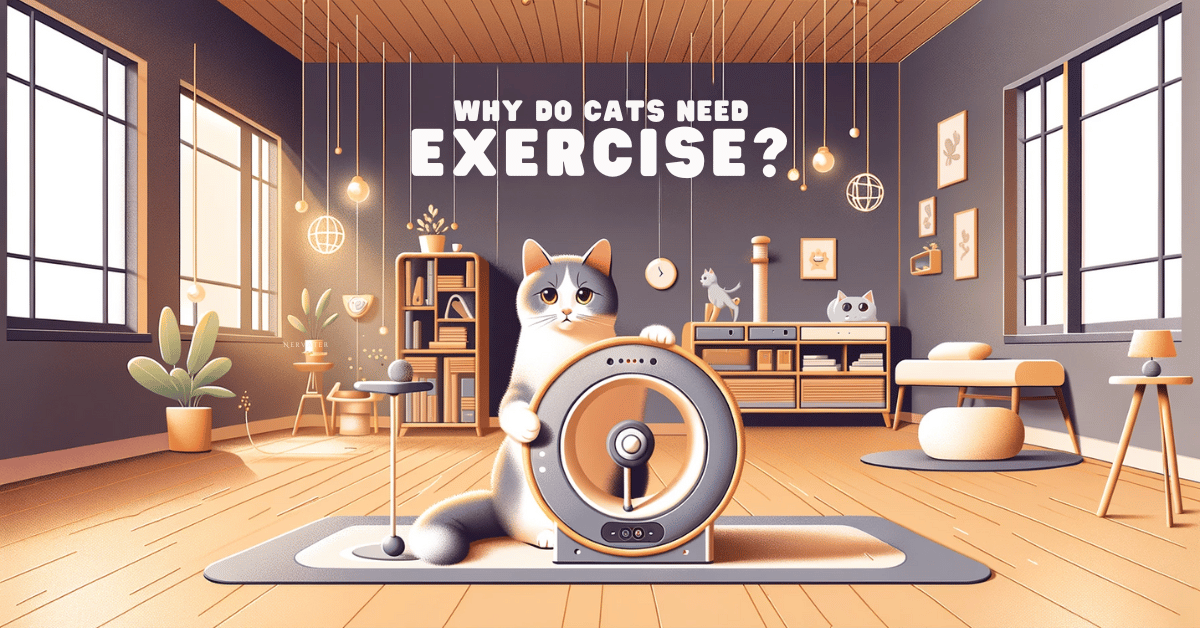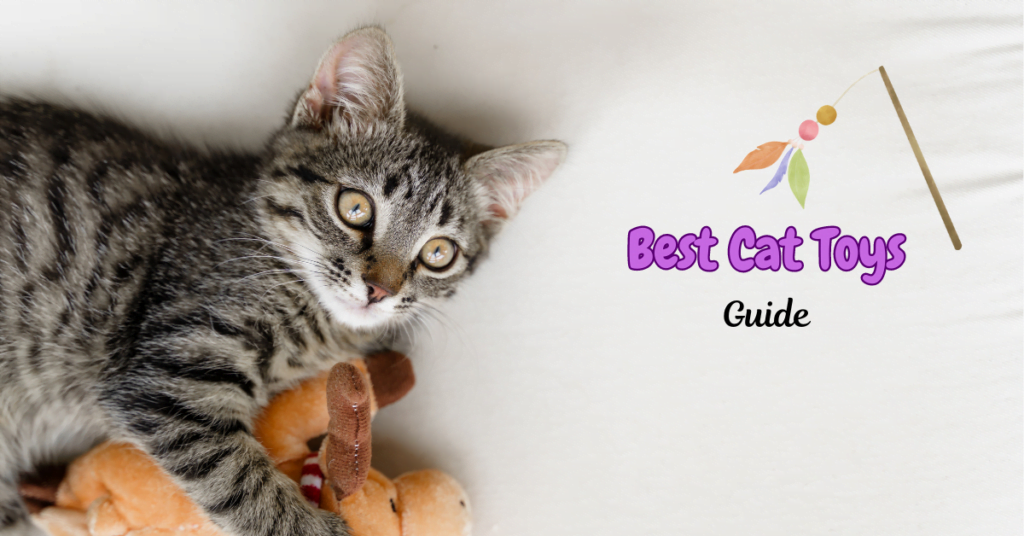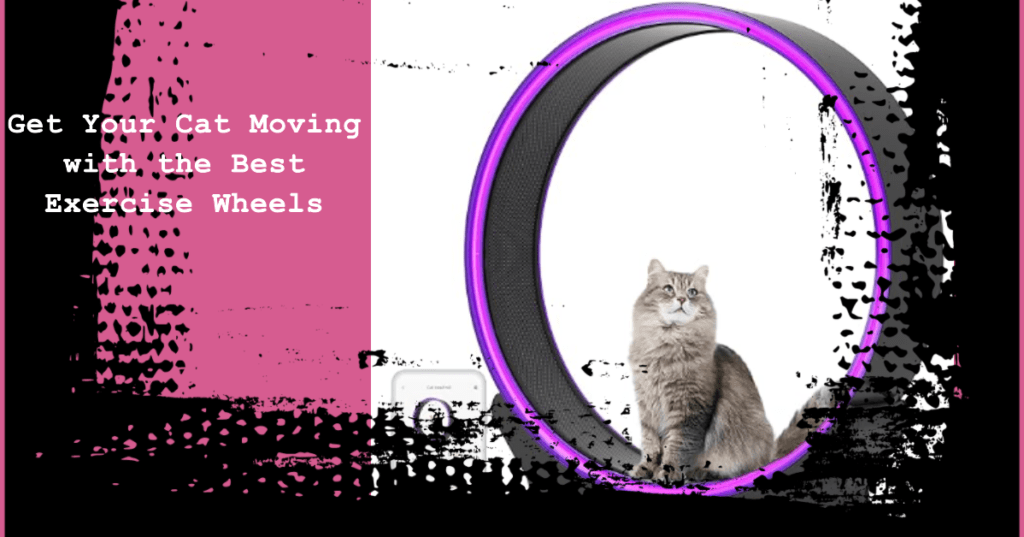This post contains affiliate links and I will be compensated if you make a purchase after clicking on my links.
The Essential Role of Exercise in Your Cat’s Life
Ever wondered, Why do cats need exercise? while watching your furball suddenly sprint like a bolt of lightning from room to room?
It’s not just a burst of feline madness; it’s a clue to their wild, untamed nature. These sudden sprints aren’t just for your entertainment (though they’re definitely Instagram-worthy); they’re rooted in a deep-seated need for physical activity.
Exercise isn’t just a luxury for our whiskered companions; it’s a fundamental part of their well-being. Just like us, cats need regular physical activity to keep their bodies strong, their minds sharp, and their spirits high.
But why is it that the cat who can leap onto the highest shelf in a single bound sometimes seems more interested in a marathon nap session?
Understanding the necessity of exercise in a cat’s life is not just about keeping them fit; it’s about tuning into their natural instincts and ensuring they lead a purrfectly balanced life.
Why Do Cats Need Exercise?: Key Takeaways
For the quick and curious: Yes, your whiskered wizard needs regular exercise to thrive – think of it as their secret sauce for a purr-fectly healthy life. Dive into our post for all the fun and furry details on keeping your cat in top-notch shape! 🐾💻🌟
The Natural Instincts of Cats: Domestic cats have innate hunting instincts, requiring activities that mimic stalking and pouncing for physical and mental stimulation.
Health Benefits of Regular Exercise for Cats: Regular exercise combats obesity (affecting up to 63% of domestic cats), builds muscle, improves cardiovascular health, and prevents boredom.
The Risks of a Sedentary Lifestyle in Cats: Inactivity in cats leads to obesity, diabetes, heart disease, and mental health issues like depression and anxiety.
How Much Exercise Do Cats Need?: Exercise needs vary by age, breed, and health, but all cats require some form of regular physical activity.
Fun and Engaging Ways to Exercise Your Cat: Includes interactive play, tech gadgets, and cat exercise wheels, especially important for indoor cats to remain active and healthy.
Bottom Line: To ensure the overall health and happiness of cats, it’s essential to provide regular exercise tailored to their instincts and needs. This not only prevents physical and mental health issues but also enriches their indoor environment, keeping them engaged and vibrant.
Understanding a Cat’s Need for Exercise
How a Cat’s Hunting Instinct Influences Exercise Needs
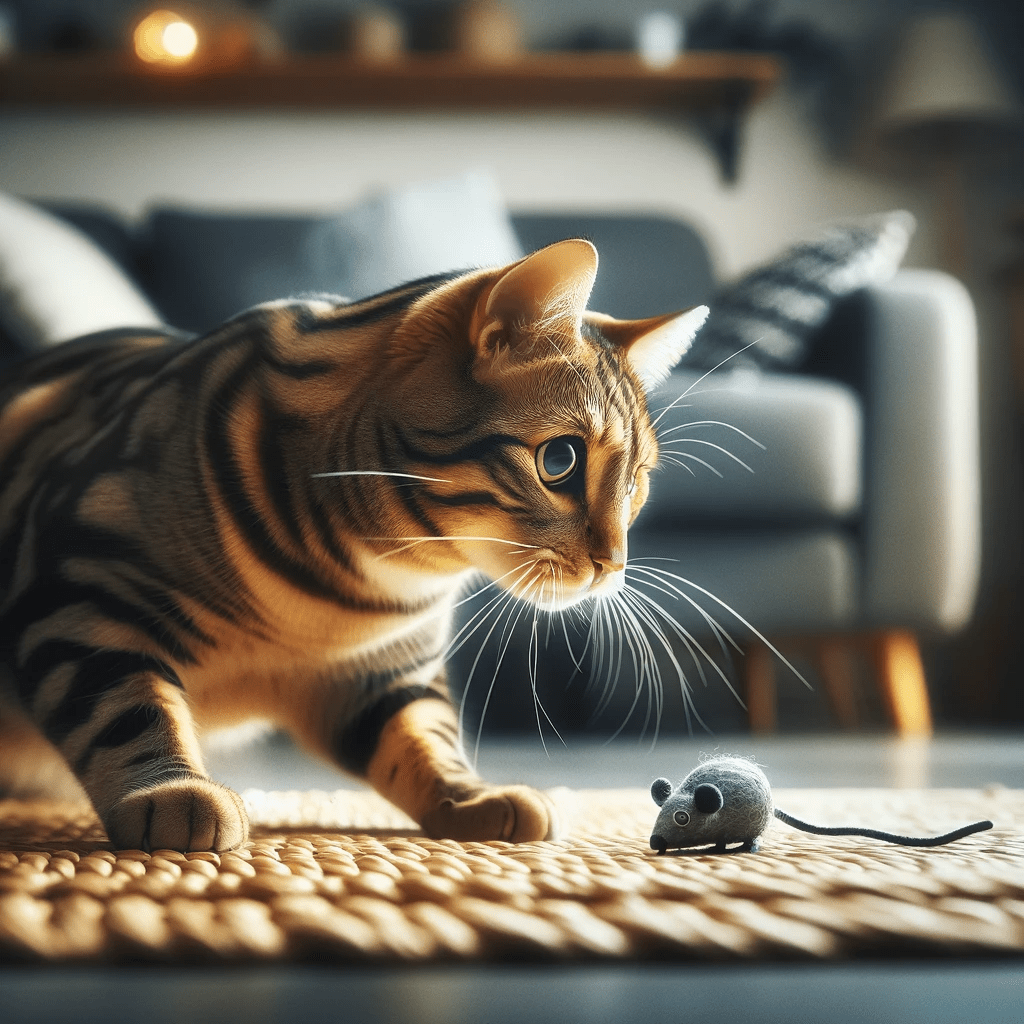
Ever watched your kitty pounce on a toy mouse with the precision of a seasoned hunter?
It’s not just a cute playtime quirk. Our domestic furballs are hardwired with the same hunting instincts as their wild ancestors. These instincts are like vintage software that’s been updated for modern, couch-friendly felines.
In the wild, cats spend a significant portion of their day stalking and hunting prey, which is essential for their survival. This isn’t just about the catch; it’s about the thrill of the chase.
Even though the closest thing to ‘prey’ your indoor kitty might encounter is a rogue sock, their inner leopard is still very much active. That’s why you’ll often find them chasing shadows, attacking feather wands, or leaping at laser dots.
These behaviors aren’t just fun and games; they’re echoes of a primal hunting dance, deeply embedded in their feline psyche.
Replacing Hunting with Play: Why Your Cat Needs to Stay Active
So, why do cats need exercise?
Well, in the absence of actual hunting, exercise is the next best thing. It’s like substituting their natural wilderness adventure with a home-based fitness regime.
Engaging your cat in regular play and exercise isn’t just about physical activity; it’s about tapping into those ancestral hunting routines. When your cat chases a ball or leaps after a string, they’re not just burning calories; they’re fulfilling an ancient instinct.
This is where exercise wheels, interactive toys, and even a simple game of ‘catch the feather’ come into play. They serve as modern-day stand-ins for the activities their ancestors engaged in for hours.
By providing opportunities for these natural behaviors, we’re not just keeping our cats physically fit; we’re honoring their history and keeping their hunting skills sharp. In the world of domesticated bliss, exercise is the key to unlocking their wild essence, keeping them not just physically fit but mentally stimulated and emotionally satisfied.
Health Benefits of Regular Exercise for Cats
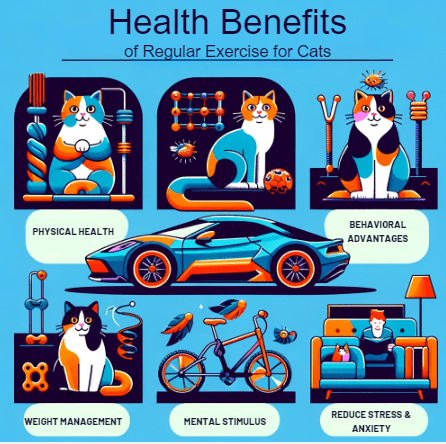
Improving Physical Fitness in Cats
Think of your cat as a high-performance, purring sports car – it needs regular tune-ups to stay in race-ready condition. Exercise plays a key role in managing weight and keeping them sleek, agile, and ready for action. It’s their personal fitness routine, sans the gym selfies and protein shakes. Regular physical activity is crucial, especially for the indoor lounge leopards, to stave off the sneaky creep of obesity.
Feline obesity is a very common disease, occurring in up to 63% of cats in developed countries.
But the perks of a good workout go beyond just keeping the scales in check. It’s about building muscle, keeping those joints limber, and ensuring their cardiovascular system is as robust as the latest tech gadget.
Mental Health and Play: Keeping Your Cat’s Mind Active
Now, let’s dive into the mind gym. Cats need more than just a physical workout; they crave a mental marathon too. A cat without enough mental stimulation is like a smartphone without apps – underutilized and prone to ‘misbehaving.’ Boredom in cats can manifest in all sorts of furniture-destroying ways. That’s where regular playtime comes in, offering brain-teasing challenges that keep their minds as sharp as their claws.
Whether it’s outsmarting a puzzle feeder or calculating the perfect pounce on a feather wand, these activities provide essential mental stimulation, keeping boredom and its mischievous side-effects at bay.
How Exercise Prevents Behavioral Issues in Cats
Have you ever noticed how a workout can transform your moody feline friend into a purrfectly content kitty? Regular exercise helps to dissipate those bursts of nocturnal zoomies and keeping daytime mischief to a minimum. When cats have an outlet for their boundless energy, they’re less likely to turn into little four-pawed tornadoes around the house.
Plus, a good play session is like hitting the reset button on their mood, reducing anxiety and stress. By keeping your cat both physically and mentally engaged, you’re not just promoting fitness; you’re fostering a serene and harmonious feline-human coexistence.
Dangers of Inactivity in Cats
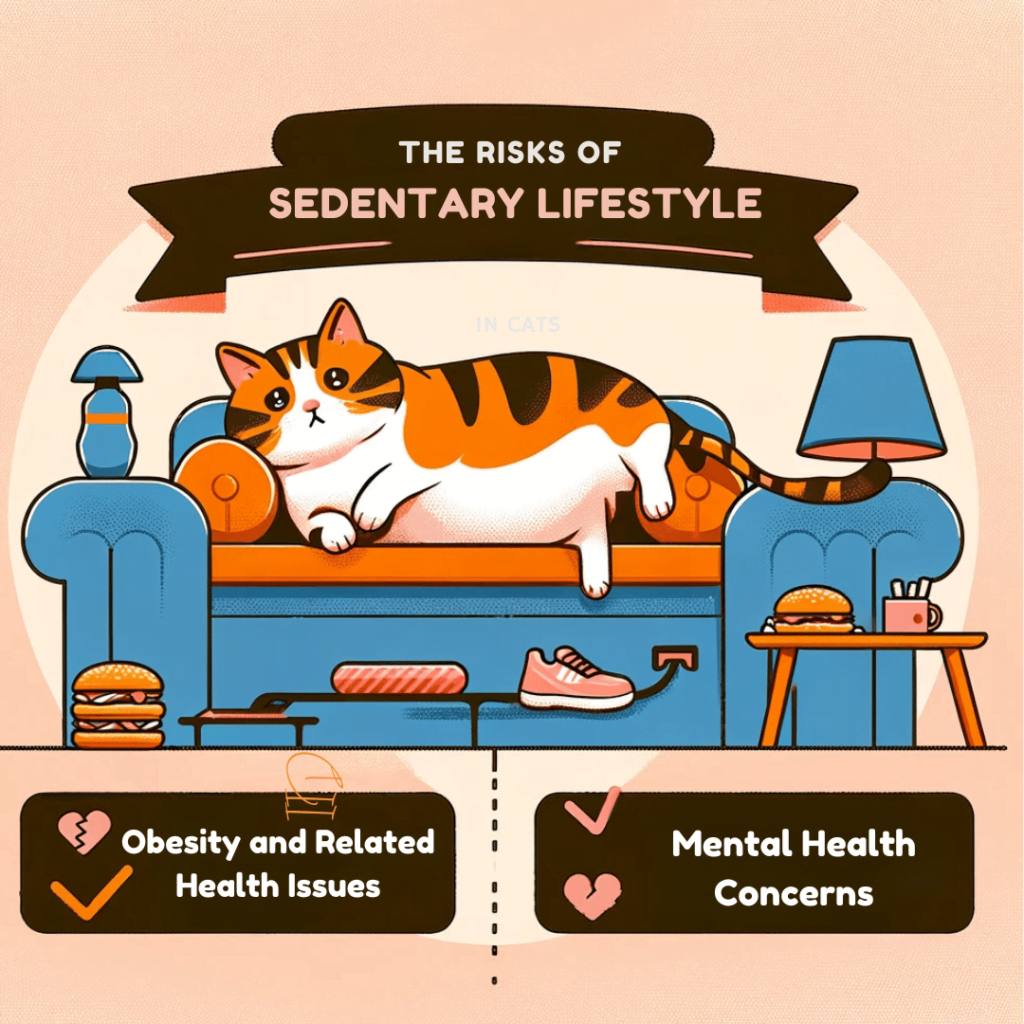
The Link Between Obesity and Inactivity in Cats
Let’s face it: a cat lounging on the sofa can be adorable, but too much couch time can lead to more than just extra fluffiness. When cats swap their natural prowling and pouncing for perpetual napping, they risk joining the ranks of the roly-poly.
Obesity in cats is no trivial matter; it’s a gateway to a host of health issues, akin to opening a troublesome Pandora’s box. Excess weight can lead to diabetes, a sneaky foe that can drastically alter their quality of life. It doesn’t stop there: obesity can also increase the risk of heart disease and joint problems.
Mental Health Risks for Less Active Cats
Now, onto the mind. An under-stimulated cat is akin to a bored tech whiz with no internet – there’s potential, but no outlet for their skills and energy. Lack of mental and physical stimulation in cats can lead to a form of feline cabin fever, manifesting as depression or anxiety. These aren’t just passing moods; they’re serious mental health concerns that can affect their overall well-being.
Signs of depression in cats can be subtle – less playfulness, more lethargy, changes in eating or grooming habits. Anxiety, on the other hand, might show up as restlessness or aggressive behavior.
Just as we need our regular dose of mental engagement, our whiskered companions need theirs too. It’s about keeping their mind active and alert, ensuring they’re not just physically fit, but mentally vibrant as well.
How Much Exercise Do Cats Need?
Tailoring Exercise to Your Cat’s Age and Health
Figuring out the perfect amount of exercise for your feline friend is a bit like setting the right privacy settings on your new app – it needs a bit of tweaking to get it just right. Cats, much like their human counterparts, have varying needs when it comes to staying active.
It’s not a one-size-fits-all deal. The ‘right’ amount can differ based on age, breed, and overall health. Kittens are like little fur-covered energy balls, needing more playtime to burn off their endless enthusiasm. Senior cats, meanwhile, might prefer a more leisurely pace, akin to a casual stroll through your favorite playlist.
But don’t let their napping skills fool you. Even the laziest of lounge cats needs some form of regular exercise to keep their body and mind in tip-top shape. It’s about finding that sweet spot where they’re getting enough activity without overdoing it.
If you want to understand how much exercise your whiskered companion needs to stay in purr-fect health (and let’s be honest, keep you entertained), leap over to our detailed post: How Much Exercise Do Cats Need?.
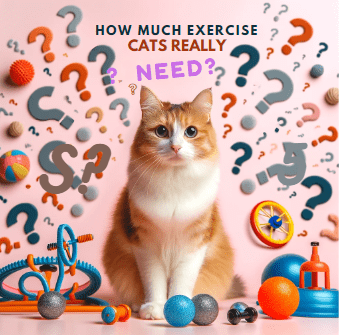
Creative and Effective Cat Exercise Methods
Engaging Your Cat with Interactive Play
Interactive play is like the latest multiplayer game for cats – it’s all about engagement, strategy, and fun. Think feather wands that mimic the erratic movements of prey, or a simple string that can send your cat on a thrilling chase.
These games engage your cat’s hunting instincts, keeping their minds sharp and bodies agile. It’s about creating those moments of bonding while ensuring they get their daily dose of activity.
High-Tech Solutions for Cat Fitness
For the tech-savvy cat enthusiast, the world of feline fitness gadgets is a treasure trove. Automated gadgets like automatic moving ball puzzles, interactive mice, and rotating laser pointers or motion-activated toys can keep your cat entertained even when you’re not around, ensuring they get in their exercise quota. These gadgets are perfect for stimulating your cat’s natural hunting instincts, providing hours of entertainment and essential physical activity.
The Role of Exercise Wheels
And now, let’s roll out the big gun – the cat exercise wheel. Think of it as a treadmill, but way cooler and more cat-friendly. Exercise wheels are a fantastic solution, especially for indoor cats who don’t have as much room to roam. They provide a safe and fun way for your cat to run and stretch their legs, all within the comfort of your home. Wheels are great for high-energy breeds (like Bengals) that need a lot of exercise, but they’re also perfect for any cat looking to add some extra steps to their day.
The Purr-fect Wrap-Up to Why Do Cats Need Exercise?
So, we’ve scurried through the why’s and how’s of keeping our feline friends not just fit, but fabulously so. Why do cats need exercise?
It’s clear now that regular exercise for cats is far more than a mere luxury – it’s an essential component of their well-being, ensuring they remain agile, mentally alert, and behaviorally stable. Whether it’s tapping into their stealthy hunter’s instinct or engaging with the high-tech allure of the latest gadgets, there’s a whole world of ways to keep your kitty on the move.
Now it’s your turn to take the lead in this dance of feline fitness. Whether through interactive play, techy toys, or the sleek spin of an exercise wheel, there are endless ways to keep your cat active, healthy, and full of life.

